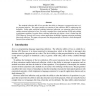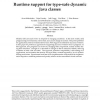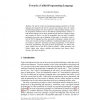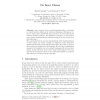118
click to vote
ECOOP
2000
Springer
15 years 5 months ago
2000
Springer
Abstract. OpenJIT is an open-ended, reflective JIT compiler framework for Java being researched and developed in a joint project by Tokyo Inst. Tech. and Fujitsu Ltd. Although in g...
93
Voted
ECOOP
2000
Springer
15 years 5 months ago
2000
Springer
The standard reflection API of Java provides the ability to introspect a program but not to alter program behavior. This paper presents an extension to the reflection API for addr...
111
click to vote
ECOOP
2000
Springer
15 years 6 months ago
2000
Springer
The Unified Modeling Language (UML) currently proposes a mechanism to model recurrent design structures: the parameterized collaborations. The main goal of this mechanism is to mo...
111
click to vote
ECOOP
2000
Springer
15 years 6 months ago
2000
Springer
This paper studies specific language level abstractions for component-based programming. We propose a simple model which captures some basic ingredients — like explicit context ...
127
click to vote
ECOOP
2000
Springer
15 years 6 months ago
2000
Springer
Modern software must evolve in response to changing conditions. In the most widely used programming environments, code is static and cannot change at runtime. This poses problems ...
109
click to vote
ECOOP
2000
Springer
15 years 6 months ago
2000
Springer
The goal of research in programming languages should be to develop languages that integrates the best of concepts and constructs from the various programming paradigms. We do not a...
118
click to vote
ECOOP
2000
Springer
15 years 6 months ago
2000
Springer
Abstract. While sequential behavior of single objects is fairly well understood, orchestrating the collective behavior emerging from the behaviors of individual objects continues t...
ECOOP
2000
Springer
15 years 6 months ago
2000
Springer
Inner classes in object-oriented languages play a role similar to nested function definitions in functional languages, allowing an object to export other objects with direct acces...
106
click to vote
ECOOP
2000
Springer
15 years 6 months ago
2000
Springer
The support for precise exceptions in Java, combined with frequent checks for runtime exceptions, leads to severe limitations on the compiler’s ability to perform program optimiz...
105
click to vote
ECOOP
2000
Springer
15 years 6 months ago
2000
Springer
In object oriented programming, it is sometimes necessary to copy objects and to compare them for equality or inequality. We discuss some of the issues involved in copying and comp...




